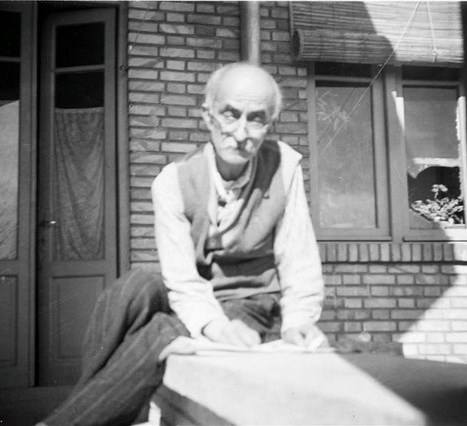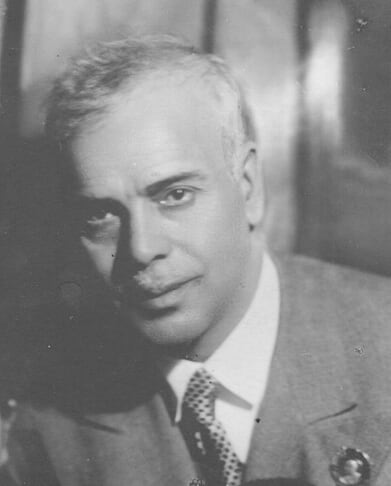Abul Qasem Elhami (Lahouti) was a poet, politician, and journalist of the constitutionalism (Mashruta) period. He was born in 1266 AH (1887 AD) in Kermashan and changed Persian poetry. Lahouti Kermashani is a Kurdish poet who became one of the pioneers of the modernist movement in Persian literature by changing the weight of Persian poetry from Aruz meter to Panja or Syllabic meter. In addition to changing poetic form from classical to modern, he was one of the first figures to introduce social and political issues into contemporary Persian poetry.

Nima Yooshij
One of the criteria of new poetry was the change of meter and form of (Aruz) rhyming poetry. Although Nima Yooshij is known as the father of new Persian poetry, according to evidence, ten years earlier, Lahouti Kermashahi began to change and renew Persian poetry. Of course, if Lahouti had not made it this way, people like Nima would not have been able to cross the path of innovation. Therefore, the step of Lahouti has been important to researchers and critics of new Persian poetry and have discussed its influence. Many researchers of contemporary Persian poetry have pointed out the position and role of Lahouti in the movement of new Persian poetry in their books, including Akhavan-sales in "Heresies and innovations of Nima" (Akhavan, 1978: 123,124,166), Sepanlou in "Four Poets of Freedom" (Sepanlou, 1990: 446), Hamidian in "The story of transformation; The process of Nima Yooshij's poetry transformations" (Hamidian, 2004: 590), Mohammad Hoqouqi in "A review of the history and literature of today's Iran" (Hoquqi, 2004: 385), Shams Lanegroodi in "Analytic History of Modern Poetry" (Shams Langeroodi, 2008: 49), Shafiei Kadkani in "Periods of Persian Poetry" (Shafiei Kadkani, 2001: 53), Gholam Hossein Yousefi in "Bright Spring" (Yousefi, 2001: 471).

The Meter of Lahouti's Poems
The meter of poetry plays an important role in influencing the readers. Nima says, “This is the meter that forms the shape of poetry, leaves no defects in it, and makes it perfect. Poetry without meter is like a naked person without clothes, and clothes give more beauty to a person. Therefore, I believe meter is necessary for all kinds of poetry” (Nima, quoted by Akhavan Sales, 1978: 97). Manipulating the meter that is the beauty of the art was not simple and few dared to touch it before an innovative poet like Lahouti. Lahouti took the courage to intervene in the common meter of thousand-year-old Persian poetry and made a new cover for Persian poetry. Other poets liked it and followed him.
Lahooti has deviated from the meter of Aruz in his poems, and twenty-eight of his fifty poems are written in Syllabic meter. He freed himself from the problems of Sarwa and dissolved the meter of Aruz in Persian poetry and added a new voice to the voices of the Mashruta period (Shafiei Kadkani, 2001: 34 and 45). Syllabic meter is the same meter that the poet used in his poems and the reason for his success in this field is the poet's deep familiarity with such meter. Lahouti was born in Kermashan and left Iran for a long time due to his political struggle and lived with his family from the Sanjawi and Qalkhani tribes. The "Kalami Saranjam" written in Syllabic meter is the most sacred book of the tribes that follow the Yarsani religion and Lahouti was among them. He was born into of Kurdish tribal family and got used to hearing the meter of the book's poems as a child. The oldest parts of Sarnjam were written in the fourth and fifth centuries AH and have a long history among the Kurds.
Apart from the book Sarnjam, the Kurdish Shanama, the poems of Hora, Siachemana, and verses of Mukriyan region, as well as the poetry of Hayran of Erbil plain and Lawki of Kurmanji regions have local Kurdish meter. They use more ten, eight, seven, and six-syllable meters. Of course, Lahouti was familiar with these meters, so he used ten, eight, and seven syllabic meters in most of his poems, which are the same common meters that are most commonly used in Kurdish verse poetry. In addition to Persian, Lahouti also wrote Kurdish syllabic poems, one of which is quoted by Mohammad Ali Sultani on page 68 of Hadiqa Sultani, his book, and the other by Anwar Sultani on page 260 in "Lahouti, a Kurdish Revolutionary Poet."

Influence in the Content of New Persian Poetry
Here we should also mention the content of his poems. At the age of sixteen, Lahouti moved to Tehran from Kermashan to continue his studies, where he became acquainted with leftist and modern Western thought and joined the political and cultural movement of the time. As a Marxist intellectual, he joined the constitutionalists, and the content of his poems was influenced by leftist, egalitarian thought, and the defense of the rights of the "labors" and "peasants" was reflected in his poems (Sepanlou, 1997: 6). Lahouti is the first poet of Iranian workers and toilers and in his poems, he has spoken about the rights of labors and toilers more than any other poet (Nosrati, 2000: 59). Sadriddin Ayni, a Tajik poet and journalist, writes about him: “Lahouti deserves to get the title of 'Red Writer' from history because he was the first to write genuine revolutionary poetry in Persian and his poems are the most beautiful beginnings of labor literature in Persian (Ayni, 1926: 586).
After being sentenced to death for opposing the Tehran authorities, Lahouti fled to Tajikistan, then a Soviet republic, where he continued to write poetry and journalism. New poetry in Tajikistan, a Persian country, began in 1907 with the works of Sadriddin Ayni, but Lahouti developed it according to his experience and knowledge of the principles and structures of new Iranian and Russian poetry. He promoted this type of poetry among the first-generation poets of Tajikistan.
As mentioned, Lahouti is a poet who, due to his innovations in the meter of poetry, is one of the pioneers of the change of form and content in Persian poetry. He was also the first poet of the oppressed and labor classes and the first to write radical revolutionary poetry. He was also considered the first person to write socialist realism poetry in Persian and as a Kurdish writer, journalist, and revolutionary, he influenced Persian poetry in these fields.









